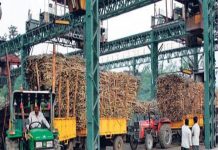Coimbatore: T.R. Sharma, Deputy Director General (Crop Science), Indian Council of Agricultural Research, said that there is a need to develop drought-resistant varieties of sugarcane suitable for Indian conditions, reports The Hindu.
He was inaugurating the ‘Germplasm and Breeding and Molecular Biology Workshop’ organized by the International Society of Sugar Cane Technologies and the ICAR-Sugarcane Breeding Institute in Coimbatore.
Sharma pointed out that sugarcane is grown in more than 100 countries in 26 million hectares with an area of five million hectares in India. Almost 1.9 billion tonnes of sugarcane are produced every year around the world. Sugarcane supplies 80% of the world’s sugar and 40% of its bio-ethanol. Being one of the largest producers of sugar and its by-products, India has a vital stake in the sector.
He pointed to the gene complexity of the sugarcane genome, fully sequenced only in March. It is necessary, therefore, to identify the individual genes and find out what their functions are if progress has to be made in breeding sugarcane. This study on the sugarcane genome assumes great significance for India, especially given the frequent drought conditions prevailing here.
The opening lecture by Prasanta Dash, Assistant Director General of ICAR, insisted that sugarcane genome sequence should be used for improving farmers’ socio-economic status and improving their livelihood. G. Hemaprabha, Director, Sugarcane Breeding Institute, Coimbatore, defined its importance to India as a crop.
These also included speeches from the International Society of Sugar Cane Technologies, with Angelique Dhont, Michael Keith Butterfield, and George Piperidis covering the major contemporary issues facing global sugarcane research and development.












